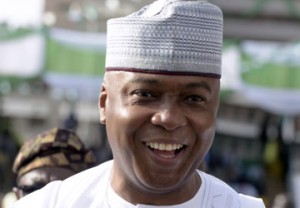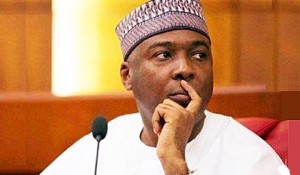
Tribune / Nigeria: The chairman of the Code of Conduct Tribunal (CCT) sitting in Abuja, Danladi Yakubu Umar, on Thursday, refused to entertain a motion filed by counsel for the Senate President, Dr Bukola Saraki, asking the chairman to disqualify himself from further presiding over the false assets declaration and money laundering charges preferred against him by the Federal Government on the ground of bias.
At the resumed hearing of the Federal Government’s case against Saraki on Thursday, Umar, while dismissing the motion, held that “the motion, as far as the tribunal is concerned, is of no consequence; not worthy to be entertained and is, hereby, thrown away.”
The defence counsel, Mr Raphael Oluyede, had brought to the attention of the Tribunal, a motion filed on Wednesday, April 20, seeking the CCT boss to excuse himself from participating in the trial, based on bias.
Oluyede had sought to move his motion when the prosecution counsel, Rotimi Jacobs interjected and told the Tribunal that Oluyede had tried to serve him the previous day, but he refused to accept it and that even the lead counsel, Kanu Agabi, to the defendant was not aware of the application.
He also told the court that Oluyede was not part of the defense team and that the application was not ripe for hearing.
The motion argued that the continued presence of Umar on the panel of Tribunal offended the provisions of Section 36(1) of the Constitution of the Federal Republic of Nigeria, which provides that “in the determination of his civil rights and obligations, including any question or determination by or against any government or authority, a person shall be entitled to a fair hearing within a reasonable time by a court or other tribunal established by law and constituted in such manner as to secure its independence and impartiality.”
When Oluyede attempted to bring up the motion on Thursday, Justice Umar repeatedly yelled at him to “Sit down.” After Oluyede demanded to be heard, Umar called for police officers to throw out the counsel for the Senate President.
The Tribunal chairman said such application was “utter rubbish” coming from a “busy body.”
Oluyede, however, responded that he had the right to file an application and address the court on it.
However, upon the arrival of the police officers, the defence lawyer took his seat, as he maintained that he would not be intimidated and the prosecution counsel, Rotimi Jacobs intervened and pleaded with the Tribunal chairman to calm the situation.
Saraki’s lead counsel, Kanu Agabi, later told the Tribunal that Oluyede was a member of the defence team and that he (Agabi) was aware of the motion sought to be moved by Oluyede and, however, apologised to the Tribunal.
After the mild drama, the business of the day, the trial of the Senate President, who is facing a 13-count charge bordering on false asset declaration, began.
Another member of the defence team, Paul Usoro, cross-examined the Prosecution Witness one, Michael Wetkas, who said the Senate President, Dr Saraki was not interrogated by the Code of Conduct Bureau (CCB) before the commencement of his trial at the Tribunal.
He said the Senate President was not invited, when the team of three EFCC investigators met with the CCB regarding Saraki’s matter and that as of the time the enlarged team met with the CCB, Saraki was not interrogated by the Bureau.
He further affirmed that the only time he was aware that Saraki made a statement was during the investigation by the EFCC and that the statement was made before two of his team members (excluding himself) Usman Iman and Musa Sunday; but added that he got to know about the interrogation through the other team members.
“I know my larger team asked him questions relating to his properties and about the asset declaration that he made before the CCB, as well as the companies he has interest in; both local and international, among others things,” Mr Wetkas stated.
Usoro then asked the witness questions on Count 12 of the charge, which alleged that Saraki operated a bank account outside Nigeria where he transferred an average sum of $3.4 million to America Express Europe Limited for onward transfer to his card account with America Express Bank, New York.
When asked if Count 12 was the same as Count 11, which also accused Saraki of operating a foreign account, Wetkas answered in the affirmative and added that the cover letter which the EFCC wrote to GTBank Plc in exhibit 8, covered the issue raised in Count 11 and 12.
When asked to point out the transaction in his exhibit that relates to Count 12, he said it was summation of the total transfer of the said account.
Usoro further asked Wetkas to point out the transactions in the document, Wetkas responded that such would make to run through the entire document and when confronted with the figures, Wetkas said that they were charges on the account and did not constitute the final figure of $3.4 million.
On the figures pointed out to him, Wetkas said he could confirm that they formed part of the total sum until it was computed again.
He, however, admitted that besides three huge transfer, other figures in the account were just charges, but that in the cause of his work, he was required to give a summation of all the transactions in his report.
However, Wetkas had started listing out the transfers, but was cut short by the tribunal chairman on ground that such would waste the time of the Tribunal, as they already had a copy of the exhibit.
Usoro then interjected, asking the panel to allow him establish his case in the interest of justice.
Speaking further, Wetkas stated that the strength of the position of the investigation team was more on the statement of account, which showed clear narration of the transaction in respect to the transfer to the America Express Europe Limited.
He added that they investigated the money laundering allegation.
As the cross examination was going on, the lead counsel, Agabi, asked for a week adjournment to enable them to study the amended charge and other documents which had been tendered.
Prosecution counsel, however, opposed the application, arguing that a week was too long and that the documents had been with them for a while.
Delivering a short ruling, the tribunal chairman refused the application for one week adjournment, but adjourned till April 27 for continuation of cross examination.



